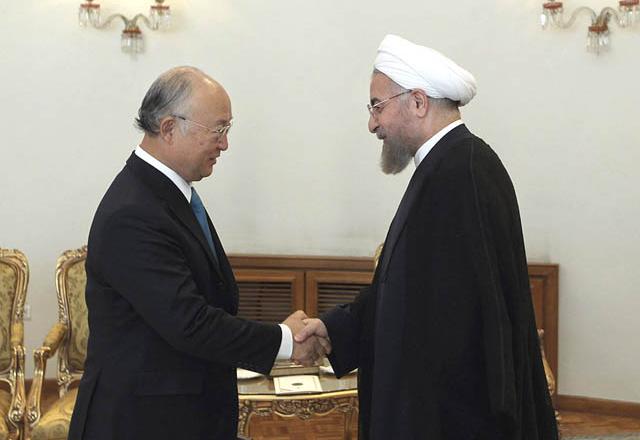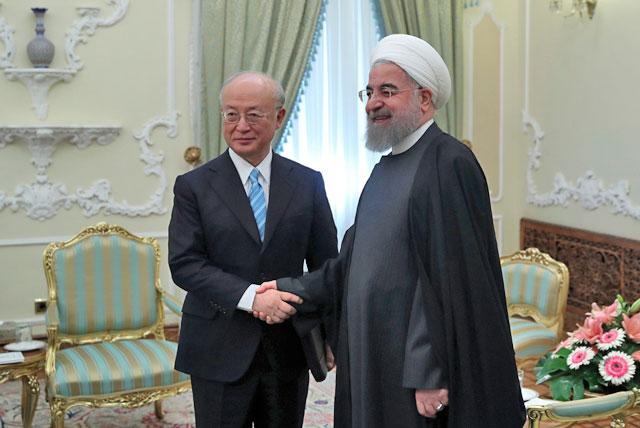You are here
Iran will not accept nuclear restraints ‘beyond IAEA rules’
By AFP - Aug 17,2014 - Last updated at Aug 17,2014

TEHRAN — Iran will reject any restraints on its nuclear operations outside the international rules set by the industry watchdog, President Hassan Rouhani said on Sunday.
"We will only accept the legal controls of the IAEA within the framework of the Non-Proliferation Treaty," the president said during a visit by International Atomic Energy Agency chief Yukiya Amano.
"Any monitoring beyond those rules would be a precedent, against the interests of all developing countries," Rouhani said.
Amano made a one-day visit to Tehran ahead of an August 25 deadline for Iran to answer decade-old allegations of past nuclear weapons research.
He held morning talks with Foreign Minister Mohammad Javad Zarif before meeting Rouhani, Iran's official IRNA news agency reported. He later also met with Ali Akbar Salehi, head of the Iranian Atomic Energy Organisation.
As part of the implementation of the interim deal it struck with world powers last November, Iran handed the IAEA documents in April and May relating to its past research, the first time it had done so in six years.
The submissions were in response to a November 2011 IAEA report that it had intelligence that Iran had until 2003 and possibly since then conducted research into developing nuclear weapons.
Addressing these claims, long refuted by Iran, would be an important element in the comprehensive accord over Tehran's nuclear programme that Iran and world powers want to strike by November 24.
The IAEA has raised a number of questions relating to the submissions and Tehran has until August 25 to reply to these.
Amano had said in a May report that Iran showed information to the agency that "simultaneous firing of EBW (Explosive Bridge Wire detonators) was tested for a civilian application".
At a press conference on Sunday in Tehran, Amano broached the issue again, saying Iran had provided information and explanations to the IAEA on Tehran's decision, in early 2000, to develop safer detonators.
"Iran has also provided information and explanations to the [IAEA] on its work post-2007 related to the application of EBWs in the oil and gas industry which is not inconsistent with specialised industry practices," he added.
"The IAEA will need to consider all past outstanding issues, including EBWs, integrating all of them in a system and assessing the system as a whole."
'Step by step'
Amano in his talks with Rouhani on Sunday said he hoped "cooperation will continue in this more constructive atmosphere".
"The agency's aim is to move forward step by step to resolve the outstanding issues," state television quoted him as saying.
"It has no wish to drag out the process."
Rouhani again insisted that Iran's nuclear programme was for entirely peaceful purposes only.
"Weapons of mass destruction have no place in [Iran's] defence strategy," he said.
He hoped that talks with the five permanent members of the UN Security Council plus Germany, known as P5+1, would "give the Iranian people and parliament the necessary confidence to continue discussions".
"Iran is serious in its negotiations with the P5+1 group and wants nothing beyond its rights, especially concerning enrichment of uranium for peaceful aims."
Rouhani said, however: "Iran's ballistic capability is not negotiable at any level", as the United States is seeking.
In a key deal with the P5+1 powers, Iran agreed in November to roll back its nuclear programme in exchange for some relief from biting international sanctions.
A new round of talks between the two sides is expected before the UN General Assembly starts on September 16.
After several months of talks, Iran and P5+1 powers decided last month to extend their self-imposed deadline of July 20 to strike an agreement until November 24.
Such an accord is aimed at easing fears once and for all that the Islamic republic might use its civilian nuclear programme to build an atomic bomb.
Related Articles
The UN nuclear watchdog chief said on Monday Iran had begun implementing transparency measures ahead of an August 25 deadline, as part of a long-running investigation into suspected atomic bomb research by Tehran.
DUBAI — Iran has shown commitment to the deal on its nuclear programme agreed with world powers, the head of the United Nations atomic energ
Iran said Saturday it never agreed to a deadline to provide answers on its controversial nuclear programme, after the UN atomic watchdog accused Tehran of failing to deliver on time.












